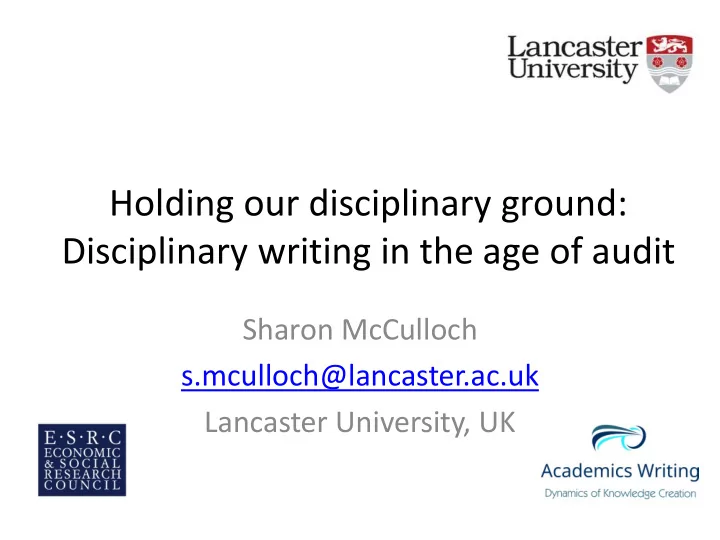

Holding our disciplinary ground: Disciplinary writing in the age of audit Sharon McCulloch s.mculloch@lancaster.ac.uk Lancaster University, UK
The Dynamics of Knowledge Creation: Academics’ writing practices in the contemporary university workplace Literacy Research Centre, Lancaster University Departments of Linguistics and of Educational Research Funded by the Economic and Social Research Council, UK
Sharon McCulloch Mary Hamilton Karin Tusting David Barton Ibrar Bhatt
Theoretical perspectives Writing practices as: • sustained through participation in a social context • socially and institutionally situated (Barton, 2007; Barton, Hamilton & I vanič , 2000; Tusting, 2003)
Audit and accountability
In terms of significance, rigour and quality World leading Internationally excellent Internationally recognized Nationally recognized
Impact beyond academia
Research questions How are academics’ writing practices shaped by socio-material aspects of their situation, including recent changes in HE in the UK? How are managerial practices shaping and coordinating writing work?
Research design MARKETING HISTORY MATHS TOTAL 19 15 15 49
Holding our disciplinary ground Marketing
I'm on probation at the moment, a four year probationary period. During that time I have to publish two papers at three star. Emma
Now back when I started it was “Just get a couple of twos, maybe a couple of threes, if you get included in the REF that’s brilliant.” Now you need, as a junior member of staff or any member of staff in this department, you need to be able to get a four star journal. Charles
So because of the research I do […] I’m not a positivist, I don’t do modelling. I have no way of engaging with that world […]. Now I target management journals, which is one way of hitting a four star. Diane
Holding our disciplinary ground History
There’s quite a high premium, on the monograph that literally is a monograph, so written by a sole author Verity
[the monograph] is regarded as the core part of our discipline, and what it is to write history, and to do something creative with our discipline, is under attack, because people don’t appreciate the amount of work that goes into it, the length of time it takes. If it takes that much time to produce then they want it to be proportionately more impactful. Rebecca
Increasingly, because we’re encouraged to think about impact, we’re being stretched away from the monograph. Rebecca
Holding our disciplinary ground Mathematics
I mean, for mathematicians, hardly anybody can understand what our research is about. Ian
I've been vice president of Institute X and so there's a policy side of what I do as well. I also do popular maths things. I see that all as part of the same job. Robert
A lot of the work is grey literature where people have written blog pieces. I think that's opened my eyes to what's possible in that area but yes, if there's time – I think it's always a question of time. Again, that work is not valued by the university as far as I can see. David
Summary • REF places very tough quality and quantity demands on academics’ writing • Impact element of REF can conflict with the rest of REF • Academics expected to find time for writing new genres for new (lay) audiences
Conclusions • Managerialist imperatives around what kinds of writing are most highly-valued are not always coherent with disciplinary values • This tension can, in the worst cases, be a source of serious anxiety
Recommend
More recommend